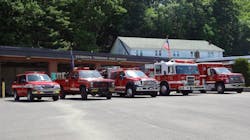FFs Say PA Fire Company's Closing Blindsided Them
By Patrick Kernan
Source The Times-Leader (Wilkes-Barre, Pa.)
PLYMOUTH TOWNSHIP, PA— As of 10 a.m. Tuesday, any and all emergencies that would formally have been handled by the Tilbury Fire Company will be handled by surrounding communities, after township supervisors effectively disbanded the department.
Township supervisor Gale Conrad characterized it as a necessary step to prevent taxes from going up, but the now-former volunteer firefighters said they were blindsided by the decision.
And Barry Lore, chief of the now-shuttered company, says he wants to fight to get the company reinstated.
While there is plenty of disagreement between the township’s supervisors and the fire crew over whether this was necessary, one thing is for sure: emergency calls in the township will be taken over by Nanticoke, Plymouth and Lake Silkworth, all municipalities that border the large township.
Conrad depicted the closure as something that’s been building for some time, pointing as far back as either 2008 or 2014 to the beginning of the problems.
In 2008, Conrad said, the fire company took out a $600,000, 40-year mortgage on the building through U.S. Department of Agriculture, but she said the township wasn’t made aware of this mortgage until 2014, when she said the fire company was beginning to struggle paying its bills. But Conrad said in the convening years, the times between the company’s requests for assistance began to grow shorter.
The fire company’s headquarters, located on East Poplar Street, is a massive building, having been converted from a high school into a fire headquarters. Conrad said that, in an attempt to help the company, the township planned to open a new headquarters, having purchased two acres of land within the township from the Diocese of Scranton with that intention.
But there was one problem, she said: “every single solitary thing” that belonged to the fire department was “tied up” in the mortgage.
“That threw a monkey wrench into everything Plymouth Township was going to do for them,” she said, adding that this caused “everything” to change.
Conrad said the fire company repeatedly asked for a fire tax be placed on the 800-some homesteads that are situated in the township, but she said this would require an increase of property taxes.
“That’s something the board is adamantly against,” she said.
According to Conrad, there’s still $512,000 and 30 years left on the mortgage.
But according to Lore, this shouldn’t have been an issue.
“You don’t get a mortgage because you want to get out of it,” he told reporters. “In 40 years, I might have been in the dirt, but the fire company would still be here.”
Lore said the amount the department was seeking from each township household was only $35, a number he suggested was a small price to pay to help ensure safety in the township.
According to Lore, the mortgage was taken out on the building to make the building something the township could use: to make the building compliant with the Americans with Disabilities Act, to structurally improve the former high school to allow fire trucks to be parked inside and to install generators so the building could be used as a shelter in the event of a major power outage, such as ones seen by the township after devastating flooding in 2011.
“To continue the service in the town the right way, we needed to have that to make this station operate,” he said.
Lore said funding for the fire company, which usually came in the way of bingo and Halloween haunted house fundraisers, simply began to dry up. He blamed both a waning sense of community driving the desire to support the company along with the township’s shrinking population after the flooding.
“With the income loss, came the struggle of how do we make up the difference,” he said.
But Conrad said that the loss of fundraising isn’t the only issue, saying the company failed this year to apply for a grant the state automatically hands out to all fire companies that apply for it that would have given, she said, somewhere between $12,000 and $18,000.
“That’s a lot because that’s a burden on the taxpayers,” she said.
Lore took ownership of this failure, which he said cost the company what was typically an average of $15,000.
“We made a mistake,” he said, adding that the department simply missed the deadline. “We only missed it one other time, and that was in 2011, when our building was underwater.”
The question that’s likely on the minds of most citizens of Plymouth Township, of course, is a simple one: Is this safe?
Conrad was adamant that the township will be fine, saying months of research have gone into determining whether or not the township could survive without a fire company.
“We’re absolutely comfortable and confident,” she said.
Lore, though, was less confident, but only slightly less so. He did say that he has some safety concerns, due mostly to the neighboring departments being stretched thin, but he said he didn’t think the situation would be “dire.”
What seemed to be his biggest concern was that the people of the township didn’t have a voice in the decision. He said he hopes the community can rally behind the company in the hopes of saving it.
“I’ve been a fireman in this community for 25 years of my life, I’ve lived here my entire life,” he said. “My goal has always been to be here for the community and provide the best level of service and ensure that if we can save the life, we’re gonna save the life.”
———
©2019 The Times Leader (Wilkes-Barre, Pa.)
Visit The Times Leader (Wilkes-Barre, Pa.) at www.timesleader.com
Distributed by Tribune Content Agency, LLC.






